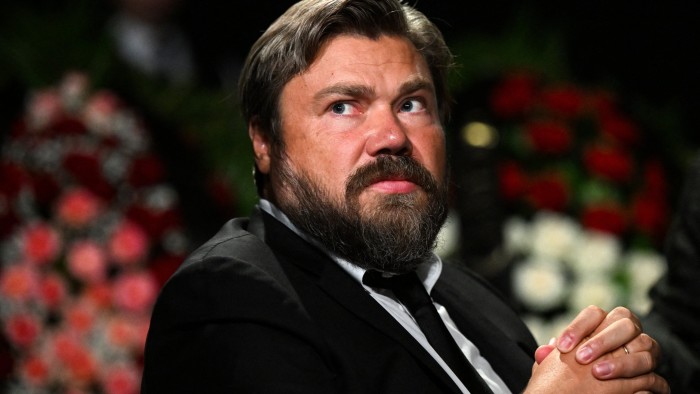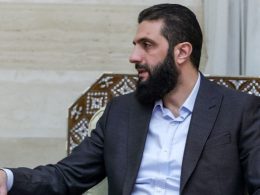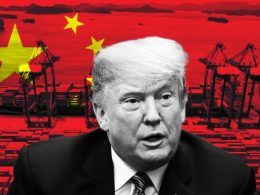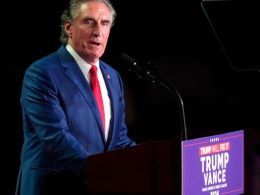Unlock the White House Watch newsletter for free
Your guide to what the 2024 US election means for Washington and the world
Donald Trump’s pledge to end Russia’s war in Ukraine is doomed to failure if the US president-elect does not involve broader talks on Moscow’s security concerns, an influential hardliner close to the Kremlin has warned.
Konstantin Malofeyev, a Russian tycoon who is subject to western sanctions, told the Financial Times that President Vladimir Putin was likely to reject a peace plan proposal by Trump’s recently nominated special envoy for the conflict, Keith Kellogg.
“Kellogg comes to Moscow with his plan, we take it and then tell him to screw himself, because we don’t like any of it. That’d be the whole negotiation,” Malofeyev said in an interview at a luxury resort in Dubai. “For the talks to be constructive, we need to talk not about the future of Ukraine, but the future of Europe and the world.”
Malofeyev said Trump could only end the conflict if he reversed Washington’s decision on the use of advanced long-range weapons and removed Ukrainian President Volodymyr Zelenskyy from office, then agreed to meet Putin and “discuss all the issues of the global order at the highest level”.
He warned that “the world is on the brink of nuclear war” after Kyiv fired US- and UK-made long-range missiles into Russian territory, and Putin responded by firing an experimental nuclear-capable ballistic missile at Ukraine.
Just days before his nomination, Kellogg told Fox News that Washington should call Russia’s bluff in response to Putin’s recent ballistic missile strike on the Ukrainian city of Dnipro and threats of further escalation. “[Putin] used [the nuclear-capable missile] for psychological reasons,” Kellogg said.
“He didn’t use it because it was militarily effective . . . but because he is kind of saying to the west ‘see what I can do?’”
Rather than “back off”, he added, the US and western allies should “lean in, because Putin will not start a nuclear war in Europe”.
Malofeyev, however, argued that if the US did not agree to roll back its support for Ukraine, Russia could fire a tactical nuclear weapon. “There will be a radiation zone nobody will ever go into in our lifetime,” he said. “And the war will be over.”
He said Moscow would only see it as a lasting condition for peace if Trump was willing to discuss other global flashpoints including the wars in the Middle East and Russia’s burgeoning alliance with China — and a US acknowledgment that Ukraine is part of the Kremlin’s core interests.
“We want a long-term peace — some sort of general agreement about the global order,” Malofeyev said. “Trump wants to go down in history, he’ll be 80 soon, he’s a grandfather. Putin’s not 50 any more either. It’ll be the legacy they both leave us.”
Malofeyev’s ideas go even further than the conditions Putin has set out for a possible ceasefire, which would require Ukraine to cede four frontline regions to Russia and agree never to join Nato.
The devout Orthodox Christian tycoon does not hold an official position but has often been an important bellwether for Kremlin hardline policy turns. In September, he married Maria Lvova-Belova, the Kremlin’s children’s rights commissioner, who is wanted by the International Criminal Court for the alleged war crime of abducting children from Ukraine.
Malofeyev was added to western sanctions lists for his role in Russia’s annexation of Crimea in 2014. The US has transferred millions of dollars from frozen assets of Malofeyev to help rebuild Ukraine and indicted him for evading the sanctions.
Despite runaway inflation and supply chain struggles under western sanctions, Malofeyev said the splurge on the war had “healed” Russia’s economy by reviving its defence industry, where factories are working around the clock in three shifts, and prompting a consumer boom.
“The old Soviet military machine is working again, and [across Russia] people are living much better than they did before the war,” he said. “People who work in the defence industry, agriculture, the consumer market, on the ground in local markets — that’s 90 per cent of the population and sanctions don’t affect them at all. They are loving it.”
Though Putin has demanded the west roll back all its sanctions against Russia for a potential ceasefire, Malofeyev argued the US-led pressure had helped rally support for the Kremlin from allies such as China, Iran and North Korea.
“The external threat is essential to make us stronger. The longer there are conflicts and confrontations, the stronger the regimes get, because it’s easier to rally the population for full support of the leaders,” he said.
Additional reporting by Christopher Miller in Kyiv
Source link









